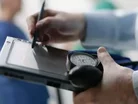Electronic Prescriptions - Flying the flag for the NPfIT

Written by: Gayna Hart, Managing Director, Quicksilva
The National Programme for IT (NPfIT) continues to be a favourite target for anti-government criticism, so it was no surprise when, in July, the Commons Public Accounts Committee concluded that the Programme was “no longer delivering a universal system” and as a result, funding is likely to be cut. However, there are two basic premises that news stories ignore when covering the NPfIT – that most parts of the Programme will go forward under different banners, and that many of the projects making up the Programme are already successful in their own right.
One such initiative that needs to be dragged into the limelight is the Electronic Prescription Service (EPS), which now enables GPs and practice nurses to send prescriptions electronically to a dispenser of the patient's choice, such as a pharmacy. This will make prescribing and dispensing more secure and more convenient for patients and staff, speeding up the process and making it less labour intensive. However, the project’s success is building slowly as unfortunately, some of the stakeholders are still dragging their feet.
This response is particularly disappointing because the prescription service in the UK is under huge financial strain, servicing an ageing and increasingly unhealthy population. At the moment, nearly 700 million prescriptions for medicines are issued each year and the paper scripts are then sent to a central repayments office where staff manually process them and reimburse individual pharmacies.
With the number of prescriptions likely to increase, there is evidently a clear need to streamline and automate the process – to make the whole system faster, leaving the GPs and nurses with more time to spend with patients. It is also possible that automation could address the challenge of security and accountability enabling the near-elimination of fraudulent scripts. Eventually, e-prescribing could be incorporated into the EPS to provide rudimentary analysis aimed at reducing prescribing errors and thereby saving lives - which Frost and Sullivan estimates account for more than 0.1 million global deaths each year.
As a first step on this path to glory, the NPfIT managed the roll out of an initial release of the electronic system across England more than five years ago. Basic though it was, it allowed prescribers working in primary care settings connected to the service to generate and transmit electronic prescriptions using their computer system. The electronic prescription could then be downloaded by a pharmacy that was also connected to the EPS and the prescription dispensed. Although again, take up of this revolutionary service was patchy to say the least.
The second release of EPS was ready to go about two years ago and its implementation would mean that patients have the option to choose or nominate a pharmacy to receive their electronic prescription automatically – without the need for paper scripts. This would also trigger the end of the bundles of fulfilled scripts making their way to the reimbursement centre as repayments would also be automated. It should be success all round thanks to the NPfIT’s EPS project but as we’ve come to expect with any NHS IT project, it is likely to snatch failure from the jaws of success.
At the moment, only 18 GP practices and 1,559 pharmacies are release two-enabled, which means, take up of the EPS2 is slow. Meanwhile, only about 40,400 patients have nominated which pharmacy they want their prescription to be sent to out of a population of nearly 60 million. So what is going on? Why no push when the benefits appear so clear?
The benefits that EPS can deliver for the GPs, pharmacies and patients are undoubtedly attractive and recent research has found there is widespread support among them for EPS. In a survey by Doctors.net, which asked 1,006 GPs about their understanding of electronic repeat dispensing, a feature of EPS, two thirds of GPs said they thought it would reduce their workload and, on average, they would expect to use it for 39 percent of patients on repeat medication.
As for pharmacies, EPS will enable them to manage their workload and accounting processes more easily. In many instances prescriptions will have been received overnight so they can manage their resources better. Patients will no longer have to worry about losing their prescription or having to wait for it to be prepared. Automation may even mean that pharmacists will have more time to dedicate to patient consultations, possibly relieving GPs of the increasing workload of minor ailments that they currently deal with.
With projects like EPS plodding forward instead of reaping huge efficiency savings for the NHS and patients alike, it is time that the Government stopped the blame-shifting and smoke-screening. As a taxpayer, I would like to see the ministers with an interest in health insisting that beneficial projects, like EPS, many of them initiated by NPfIT, are delivered without further delay.
Graham Spearing, Programme Manager from NHS Connecting for Health, explains how the EPS was tested:
About Gayna Hart and Quicksilva:
Gayna Hart is the founder and Managing Director of Quicksilva. She plays a hands-on role in all aspects of Quicksilva, from human resources and company finance through to marketing and maintaining healthy client relationships. She brings over 25 years’ experience in Information Technology, across both the public and private sectors.
Quicksilva Integration Solutions is an independent UK-based supplier of software solutions and integration services. It has a particular focus on the healthcare market, currently working in a number of areas of the NHS Connecting for Health programme. These include the Electronic Prescriptions Service and access to the central Spine database through its Spinal Tap® secure messaging engine. It counts many of the PCTs and 85 percent of UK pharmacies as customers.
Our magazine is now available on the iPad. Click here to download it.
